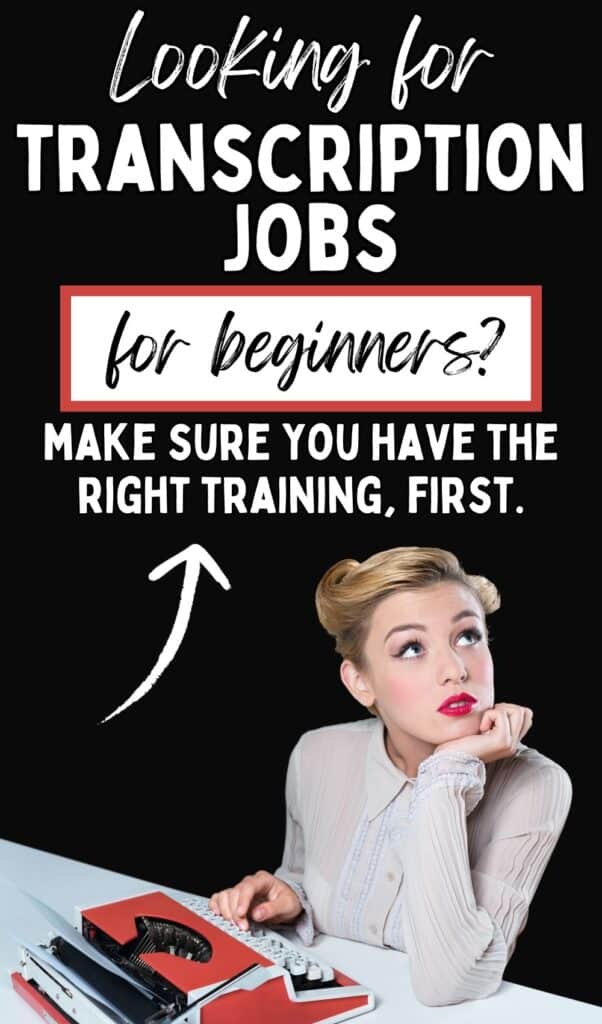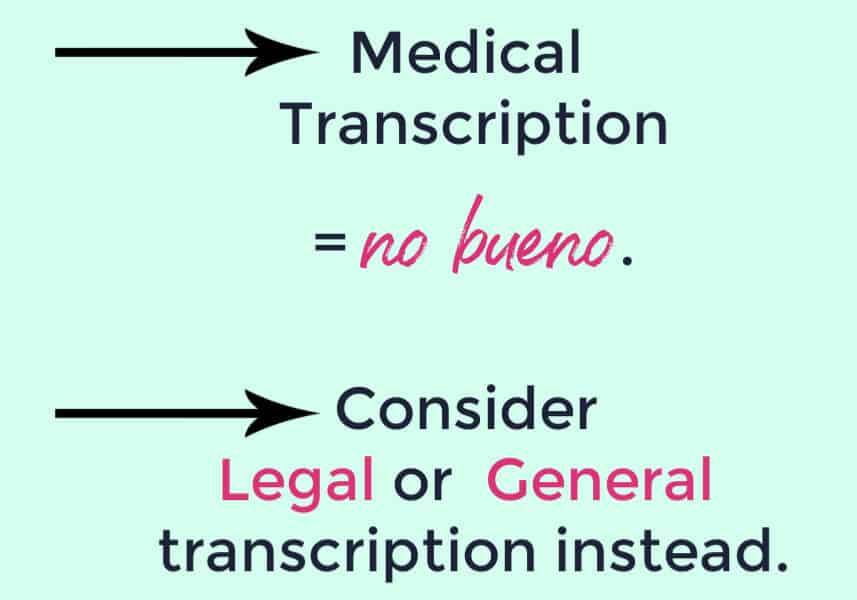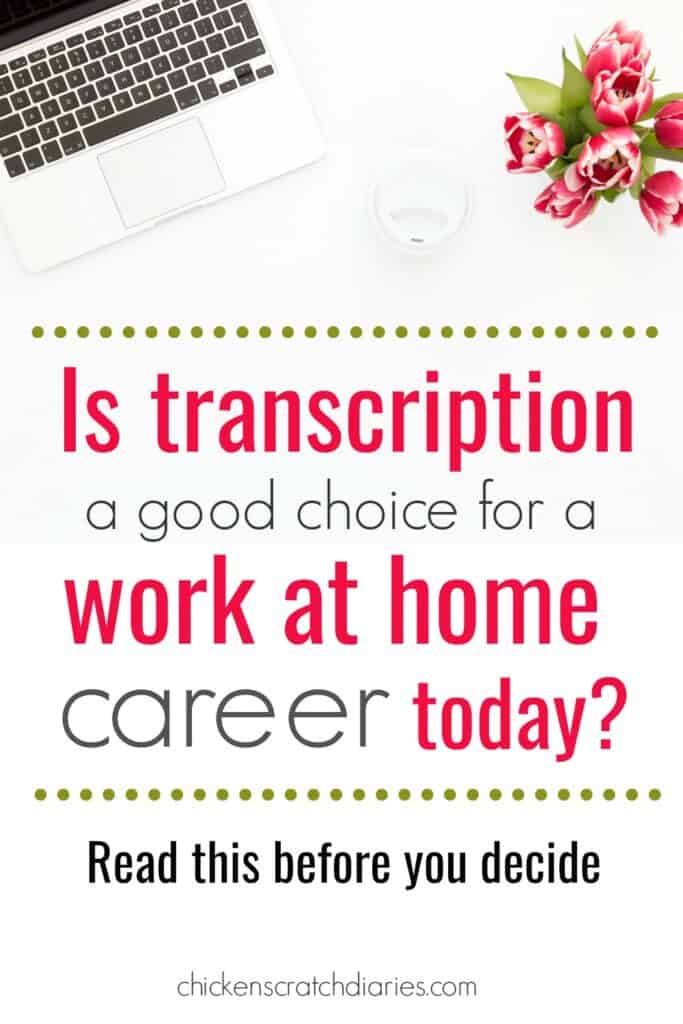If you’re thinking about becoming a transcriptionist in either the medical, legal or general transcription fields, this article can help you to decide whether this is a good career choice for you.
In this post, I’m going to detail what you NEED to know before you get started working as a transcriptionist…
…or before you even start a transcriptionist course.
The road to becoming a transcriptionist
A little background of what led up to my transcription career:
Several years ago, we wanted to expand our family.
BUT I was determined to find a work-from-home career to replace my job at the busy law firm where I worked as a lead paralegal.
There were things that I loved about my job – and things that totally made me crazy.
And ever since our first child was born, I felt like I left my heart at home each day.
(Or, that wherever she went – it went too.)

Knowing how hard it would be to continue working outside the home with another little one on the way, I knew I would have to think outside the box.
I needed to find a work-at-home career that would bring in the income we needed while allowing me to be home with my kids.
So I started researching work-at-home options. It was a little overwhelming, narrowing down my options.
Transcriptionist training was one of the first ideas I seriously considered.

This post likely contains affiliate links. Please see our disclosure for more info.
What is a medical transcriptionist?
First things first:
In case you’re unfamiliar with what a transcriptionist actually does.
Transcribing is simply the process of taking an audio recording and turning it into a written (typed) document.
As a medical transcriptionist, you would be given digital audio files that doctors have dictated (spoken into a digital recorder).
Using a pair of headphones, you type what you hear in a very specific format.
You also use a foot pedal to start and stop the audio as you type (very important).
Then after proofreading, editing and more formatting, you upload the finished product for your employer or the company you are contracting with.
Of course, that’s the simplified version of what working as a transcriber entails.
The actual job is a bit more complicated, as I’ll detail in this post.
Why become a transcriptionist?
I had always had the idea that I might enjoy medical transcription – meaning, turning audio files into written reports.
And it seemed like it would be a good fit for me.
I was a fast typist; I worked well independently.
And I had a pretty good knowledge of medical terminology already.
(A big part of my legal job was working with medical evidence.)
I decided to research how to become a transcriptionist to find out more of what it really entailed.
I had questions such as:
- Did I really need transcriptionist certification?
- How long would the course take?
- Is being a transcriptionist hard?
- Is transcription worth it (the time, the training versus pay)?
- What was the job outlook for transcription in general?
Taking the plunge
I kept seeing ads for “Become a Medical Transcriptionist and make $40,000/year from home!”.
And it was just too tempting.
Without a lot of investigation into the various transcriptionist training courses, I signed up for a program with a company called Career Step and plunged into the materials.
Since then, I’ve been asked, “Is medical transcription hard?” (Same question I initially had.)
And I have to say the resounding answer in my experience is, YES!
Transcription training is complex
The training I had involved a certificate course. Honestly, it was one of the hardest courses I’ve ever taken.
(And I have a Bachelor’s Degree plus some post-graduate credits!)
I remember joking that I should be called “Doctor” by the time I finished training to be a medical transcriptionist.
I had to learn so much about anatomy, terminology, and medications, it seemed almost excessive.

It took me six months to get through the program, working in the evenings, late at night and on weekends.
But I finally finished it!
My search for Medical Transcription jobs from home
When it came time to find a job, however, reality set in.
I was quickly dismayed to find that there were very few jobs that I was even eligible to apply for in this field.
Most employers wanted at least 3-5 years’ experience.
In addition, I found out that many, many medical transcription jobs were and are being outsourced overseas.
Little did I know, medical transcription was becoming a dying field for many reasons.
In the meantime, we found out, lo and behold, that we were expecting our third baby. Hooray!
But by this time, I was really under pressure to find a transcription job.
I had spent almost $3,000 on a course and was having NO luck; not even a courtesy response from the multitude of jobs I had applied for.
How I finally used my transcription training
Despite the hard realization that medical transcription may not be a good career choice…
…I believe God was intervening on my behalf.
One day by chance, I ran across a company that provided legal transcription services.
They also happened to be hiring for “legal transcription jobs from home”.
Not only were they hiring, but the field of law they specialized in was the exact same field that I worked in at my current job at the time.

Working as a legal transcriptionist
So finally, I started working as a transcriptionist.
And I was so grateful for the opportunity.
And I do think that having a transcription certificate along with my experience in the legal field helped me to land this job very quickly — even without legal transcription certification, specifically.
After a few months of getting my feet wet and learning the hands-on aspect of the work, I left my job of 10 years at the law firm.
I was two months pregnant and it was time to dig into this work-at-home life.
My work as an independent contract transcriptionist lasted for two years.
(I’ll explain why. Life brings unexpected seasons!)
The major blessing was that I was able to stay home with my son during this time, as I had hoped!

But, keep in mind that I spent $3,000 and six months’ worth of grueling study on training I didn’t fully utilize.
And there’s much more to consider about being a transcriptionist.
If You’re Thinking about a Transcription Career- Read This
Here’s my thoughts on transcription: the good, bad and ugly that you need to understand if this is a work-at-home career you’re interested in.
#1. Transcribing is not about being a fast typist, it’s about this:
Being accurate and precise
This is much more important than being fast.
You will learn to be fast over time.
It’s much more critical to learn good listening skills…
…and translate that into a polished document that accurately conveys whatever you’re transcribing.

Most employers or clients have a very strict set of guidelines.
These are guidelines you must learn in order to format the document the way that they require.
This has to do with the style of writing and grammar rules, for instance.
There are also many other preferences which your employer will detail for you.
You may have a 50-page document that you have to refer to over and over and make sure you’re following it to the letter.
This is the case for each and every file you transcribe, so be prepared to be very precise in this job.
There is very little wiggle room for errors in this field.
Critical thinking and research skills
In any type of transcription, you will have recommended resources for researching terms and topics.
You need to have a good working knowledge of the internet and how to research credible information.
For instance, there are many words that can sound the same in the English language.
But you have to figure out what the dictation is actually referring to within its correct context- precisely.

This is important so that you don’t look silly, and so that your employer or client doesn’t have to go behind you, correcting errors.
(Which can cost you money in many cases).
I knew right away that medical transcription was going to be challenging.
But when I’m asked skeptically, “Is transcribing hard?”
In general, I would again say, yes! It’s not impossible, but it’s all in the details.
Concentration and patience
I personally believe this is a job that requires a LOT of concentration and patience.
This is simply because transcribing is a lot more involved than it looks.
Real talk: Becoming a transcriptionist
If it were just listening and typing and doing some brush-up on grammar and punctuation, it would be a breeze, in fact!
But I also had to swiftly learn to:
- Work with a foot pedal
- Use Shorthand software
- Decipher heavy accents
- Struggle through poor audio quality
And that’s just to name a FEW hurdles that you might face as a transcriptionist.
#2. Medical Transcription employment is declining and very low-paying.
The question I should have asked in the very beginning was this:
“Is medical transcription a good job, and a good career choice in general?”
Because I would have quickly discovered that not all types of transcription have work readily available.
And even fewer offer work at a rate that pays the bills.
I honestly would not recommend that anyone purchase a transcription course specifically in the medical transcription field.
The good news about Transcription work?
Fortunately, there’s a big difference (career-wise) between medical and other types of transcription.
And sadly, most medical transcription work is being outsourced.
This means there are very few jobs available in the U.S.
The medical transcription jobs that are remaining pay much, much lower than the “Make $40,000/year” medical transcription salary ads.
(They don’t mention it’s a big “IF” you can find anyone willing to hire you.)
In fact, you might be lucky to make 1/3 of that salary projection, working more than full-time hours.
Again, that’s assuming you could land a job. It’s really that bad.
You can read more here on why you shouldn’t become a medical transcriptionist.

#3. General and Legal Transcription IS in demand.
If I had known about general transcription training, I would have done this to supplement my legal transcription job.
(I didn’t even know this was a THING at the time.)
Because I was never able to make a full-time income from one contract, alone.
And, if I had known about the Transcribe Anywhere courses, I would’ve enrolled in either the general transcription certification online or legal transcription course.
These would have set me on a far better path than the medical transcription course I had invested in.
(Hindsight is 20/20, for sure.)
Benefits of Transcribe Anywhere Programs
These courses have options starting at much less than the course I took.
And, they provide skills for relevant transcription work which is actually available today.

Which is exactly what you want if you’re needing a stable income in this field, right?
Transcribe Anywhere also offers a free workshop to help answer your questions about this field of work, and what the courses involve.
This can help you decide if this is a career you might be a good candidate for, before you dive into the paid courses. (SO smart.)
Understanding freelancing options
Not only does Transcribe Anywhere provide ongoing support to their students, but the training is geared to help you to market yourself as a freelance transcriber.
Freelancing generally pays much better than working underneath a transcription company.
So when you’re researching transcriptionist salary, keep this in mind.
This is a very important difference in the training that I received.
I had no one to explain how going these two different routes can drastically affect your earning potential.
In this aspect, it’s very similar to being a freelance writer and seeking out clients on your own, versus just applying for content-writing jobs on big job boards, at a much lower pay rate.
#4. Networking can help!
A lot of things have changed in the online business world over the last several years.
But another thing I wish I had known was there are all kinds of online forums where you can find support and transcription advice.
Courses like those offered by Transcribe Anywhere also give their students lifetime access to their Facebook group for this purpose.

If you do some searching through Facebook, you can find many work-at-home and transcription job listing groups.
In these groups, there are opportunities to network with seasoned veterans.
These are people who already know the ropes and can give you pointers to further help you along.
I believe that having this type of place to ask questions would have not only made a huge difference when I was stuck (on a difficult word or concept, for example), but would have made the job a lot less lonely!
Is Transcription a good job overall? (My opinion)
When I’m asked even today, “Is transcribing a good job?”, there are several things I want to point out from my personal experience.
These are important factors before deciding if it’s the job for you.
First, if I had done more thorough research on the different types of transcription -and the different training available, it’s possible I would still be transcribing today.
Having specific skills for legal transcription (instead of just related skills from the medical side) would have given me a better foundation for the work I was doing at the time.

For me personally, I believe I would have earned much more and enjoyed the work immensely more, with proper training on how to become a legal transcriptionist specifically.
Having more realistic expectations of what the work would entail would have also helped.
The right tools make a world of difference
When I started thinking about starting a blog as a work-at-home career, I did a lot of research.
I wanted to make sure I was investing in the right tools.
I think this made ALL the difference for me, this time around.
For me, I think that blogging was probably a better fit for my personality and skill set, since I love writing and creating my own content.
Final Thoughts on Becoming a Transcriptionist
While I don’t think there’s a one-size-fits-all work from home opportunity, the main thing I want to convey to moms looking for these types of jobs is this:
Do your research and talk to people actually working in the field you’re interested in.
Take your time and think hard about what you’re passionate about, and analyze what skills you can offer.
Then decide what type of training will put you in the best position to succeed.
My recommendation for aspiring transcriptionists
If I haven’t scared you away from transcription completely, I would highly recommend the training from Transcribe Anywhere, as I mentioned, starting with their free workshop.
Transcribe Anywhere is known in the work-at-home community as having the best transcription courses available online.
In fact, it’s the most comprehensive and it’s also an approved school with the American Association of Electronic Reporters and Transcribers (AAERT).
Another resource to check out is: The Truth About Transcription – a free ebook from Janet Shaughnessy, founder of Transcribe Anywhere.
Just know this: working from home is a huge blessing.
But it DOES require sacrifice and hard work, no matter the field you choose.
In my experience, though, it’s really true that when you’re doing something you love, it seems far less like work and far more like fulfilling a calling.
You might also like:
Benefits of Side Hustles (that are often overlooked)
Work at Home Jobs Perfect for Moms
6 MORE Work from Home Jobs Moms Can Easily Do
Success Tips for Becoming a Work at Home Mom
*This post first published 3/12/18, last updated 2/15/24.

Hi Brandi,
Thank you for this helpful information. I have been looking into legal transcription and have considered Transcribe Anywhere. I would like to know what you are basing your opinion on with this company? I have a legal background and am hesitant about taking this course online. I have done so much research and haven’t really found anything negative but am covering all my bases. Thank you so much for your input.
Hi Tina. I had to think back to where I first heard about this program, and Caitlyn Pyle from Proofread Anywhere holds an annual “Work at Home Summit” where she highlights this and several other work at home resources that are sort of considered the gold standard for these type of programs. She has an excellent reputation in the work-at-home world (incredibly successful herself as a six-plus figure proofreader). Another blogging mentor that I follow (along with several others) also recommends this particular course. Based on these things, and the background of this creator (Janet Shaughnessy (another extremely successful online teacher and transcriptionist herself), I feel confident that this is probably the most credible transcription course online. AND I just found out that it’s an approved school by the American Association of Electronic Reporters and Transcribers (AAERT), which gives me confidence that it provides more than adequate training. I think you are smart to do your research! There are definitely some bogus courses out there (same thing goes for blog training online, I’ve found). Even with the best courses, there are no guaranteed results, of course – it’s mostly on us as the student to dig in and get the most out of it! (And apply it!) Best of luck. I honestly would take this course if I was to ever consider doing legal transcription again- even with my legal background, I personally was not prepared for the technical side/business side / nuances of the transcription industry.
Thank you so much for sharing your experience! It has been rather difficult for me to find sources where people share their true feelings and experiences with transcribing. What I have found so far has mostly been composed of negative reviews from bitter people or overly positive reviews from those who are clearly trying to promote a specific company (advertising). So thank you for taking the time to write about this, so people like me can get a genuine look at what being a transcriptionist might be like. 🙂
So glad the info was helpful Shea! Good luck.
I’m so happy I stumbled upon your blog. I’m currently a mom of 2 (5 and 2) and I’ve gone per diem in my career to be able to raise the kids while my husband goes to school and work at nights. I’m trying to find a steady at home job for income and this really helped me towards the right direction. I was leaning towards medical transcription already being in the medical field but thanks so much for helping me see the really facts about it!
I wish I had better news about medical transcription, but glad you were able to find the info you needed! 🙂
Honestly, it angers me that schools like Career Step are still trying to convince concerned potential students that medical transcription is not a dying field. You’re not wrong. Unless you live in a low-pay, low-cost-of-living country where the work is being offshored, you can’t make a living off of it. I know too. I took a fantastic medical transcription course with the now-nonexistent M-Tec (Medical Transcription Education Center), passed with a 96% grade, and struggled to make a living. Wages have been eroding, and more editing work is being offered for peanuts. Editing work that takes longer than just doing the transcription correctly the first time.
I want to do court transcript proofreading but can’t afford the prohibitive (to me) costs of the only two courses I’ve found, so now I’m looking at a court transcriptionist course here in Canada that is under $500, will make me a certified court transcriptionist in Ontario, and will allow me to offer transcript proofreading services as well (or only, if I decide transcribing isn’t for me). I figure that if I can create a transcript, I can proofread them for others. Kill two birds with one stone.
I’ve started a copy editing and proofreading business, but competition is so stiff, that I’d like to niche down. I have a background in legal office administration, so I figured this was a way to go.
Agree wholeheartedly. When I was doing transcription, I was asked by the company I contracted with to do editing work which I flatly declined for the same reasons you stated. I’m also glad to know about the proofreading competition because I am asked about that occasionally and I was not sure of the outlook for proofreaders. I hope you find the right niche that is a good fit and meets your needs all around!